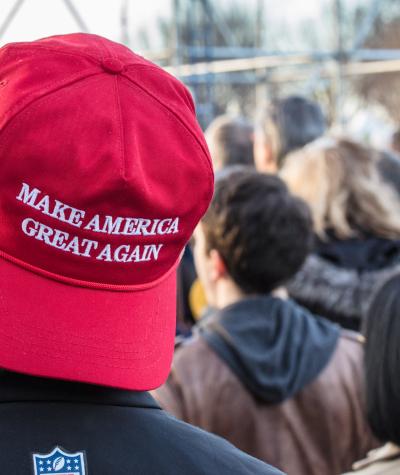It is illegal to make political contributions in the name of someone else. Yet, in recent months, three corporations appear to have been used to do just that.
The disclosure of who’s spending to influence elections is critical to our democracy—it’s how “citizens can see whether elected officials are ‘in the pocket’ of so-called moneyed interests,” as Justice Anthony Kennedy even emphasized in Citizens United. But voters are denied this information if political contributions are laundered through shell corporations set up to protect the anonymity of the true donors.
With two new complaints against corporations that collectively have given more than half-a-million dollars to super PACs this year, CLC is calling on the Federal Election Commission (FEC) to act.
Global Energy Producers LLC
Global Energy Producers LLC (GEP) was one of the biggest donors to a pro-Trump super PAC. But the LLC didn’t form until April of this year, Delaware corporation records show, has no website or other discernible public presence, and shows no evidence of any business income.
Yet somehow, just a month after it formed, it was flush with enough cash to give $325,000 to America First Action Inc., which describes itself as “the primary super PAC dedicated to electing federal candidates who support the agenda of the Trump-Pence administration.”
CLC filed a complaint with the (FEC) calling for an investigation, since this appears to be yet another example of shell corporations being used to funnel money to super PACs while evading any donor disclosure or accountability.
Read the Bloomberg story that followed CLC’s complaint.
Available evidence suggests two businessmen, Igor Fruman and Lev Parnas, are behind this shell corporation. In contributions they have made under their own names, Fruman and Parnas have listed addresses that match GEP’s addresses in federal and state campaign finance records, and both men explicitly listed GEP as their employer in contributions they made in June.
According to two Russian-language news articles that CLC obtained, the Ukrainian-born Fruman and Russian-born Parnas met personally with President Trump at a small closed-door meeting in Washington just weeks before GEP gave $325,000 to America First Action. Fruman also reportedly attended an event at President Trump’s Mar-a-Lago property in Florida in March.
The FEC must take this matter seriously and investigate whether Fruman, Parnas, or others violated campaign finance law by using a shell corporation to disguise the true source of six figures in political contributions. The FEC should also determine whether GEP failed to properly register as a political committee.
Blue Magnolia Investments LLC and Highway 76 LLC
Also this year, Blue Magnolia Investments LLC and Highway 76 LLC were major donors to a super PAC called DefendArizona. But they registered as corporations in Delaware only five weeks before making their contributions, and, like GEP, do not appear to have public footprints or show signs of legitimate business income.
Five weeks after forming, Blue Magnolia and Highway 76 each gave $100,000 to DefendArizona, which is reportedly supporting Martha McSally in the U.S. Senate race in Arizona. These contributions placed Blue Magnolia and Highway 76 among the top five donors to this super PAC. The timing of their formation so close to their six-figure donations, together with the absence of any evidence that either took in anywhere close to $100,000 in legitimate business income in five weeks, points to these LLCs being established for the purpose of anonymously funneling large sums to DefendArizona.
CLC’s complaint calls on the FEC to investigate.
Read the Daily Beast’s coverage of CLC’s complaint against Blue Magnolia and Highway 76.
***
CLC has long pointed to the problem with shell corporations being used to evade disclosure laws. This could be a way for foreign actors, who are not permitted to engage in political activity in the U.S., to secretly make contributions to super PACs supporting campaigns. Without the FEC enforcing the law, this is a clear pathway for secret actors to influence U.S. elections.
In the 2012 and 2016 election cycles, CLC filed a series of FEC complaints addressing the use of LLCs to mask the identities of both Democratic and Republican donors who gave contributions to super PACs ranging from $857,000 to over $12 million. Several of the donors openly admitted to the media that they contributed through LLCs and other opaque corporate entities for the purpose of hiding their identities from the public.
The FEC deadlocked on enforcing the law against the donors who used LLCs to mask their identities in the 2012 and 2016 cycles. However, the Republican Commissioners laid down a standard that they said they would use for future cases. If an LLC with no public footprint makes a big donation to a super PAC shortly after its creation, and there is no evidence the LLC had any business revenue or legitimate investments, the FEC has signaled it will open an investigation.
The use of GEP, Blue Magnolia, and Highway 76 to launder money into the 2018 elections will present a critical test of the FEC's stated commitment to enforcing the law against sham LLCs.
